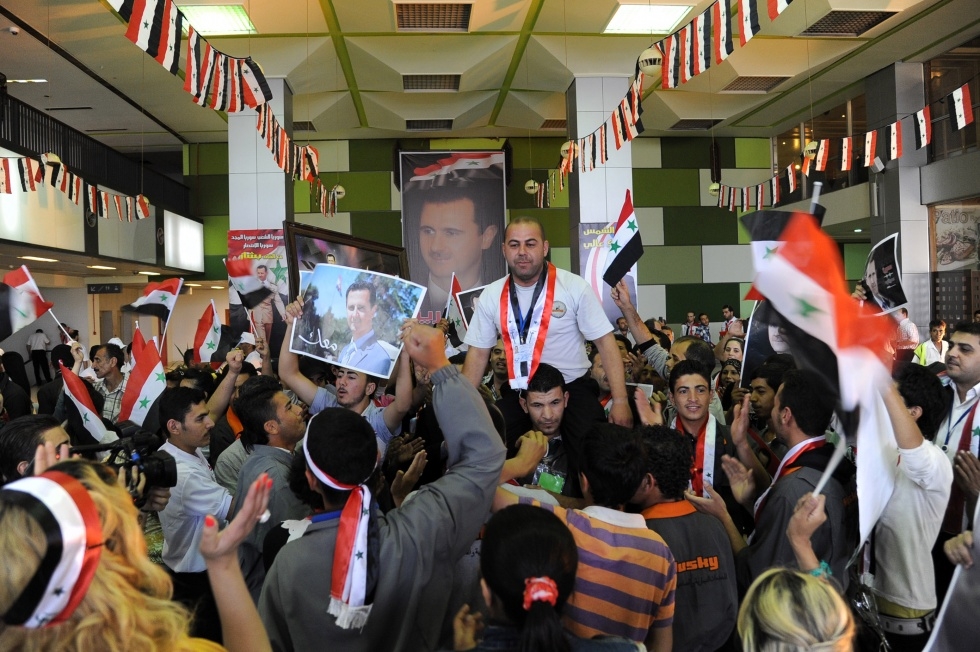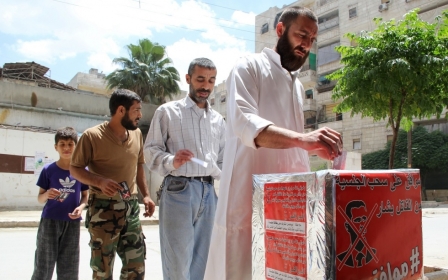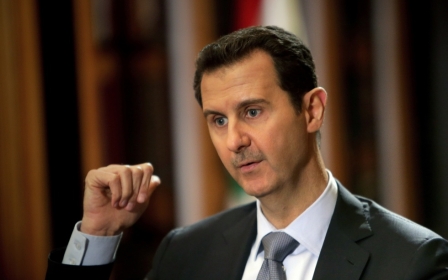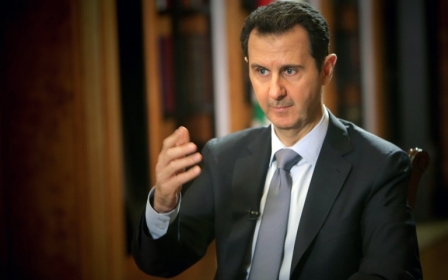Sporadic mortar attacks accompany Syrian election

Several mortar attacks were reported in Aleppo and Damascus on Tuesday as Syria's presidential elections took place in government-held parts of the country.
Ahead of the elections, there had been fear of reprisal from opposition groups that have slammed the vote as a “farce”. It was unclear late Monday if the mortar attacks had caused any casualities.
Mortar was also reportedly fired from Syria into the Golan Heights on Monday morning, landing near a military post at Mount Hermon without causing damage. The Israeli army responded with artillery fire, the Israeli newspaper Haaretz reported. Sporadic mortar attacks from Syria into Israeli have occured regularly since the civil war began in 2011.
Voting began at 7:00am (04:00 GMT) in 9,000 voting offices open only in areas under regime control, with people seen queuing outside voting offices in Damascus, where billboards and posters glorify the head of state.
Assad and his British-born wife Asma cast their ballots in the upscale Maliki neighbourhood in central Damascus, the president wearing a dark blue suit, the first lady a white blouse, a black business skirt and stiletto heels.
Enthusiasm appeared to be high among government supporters, some of whom were seen pricking their own finger so that they could vote for the Syrian president with their own blood.
Assad, embroiled in a more than three-year uprising against his rule, is almost certain to win the controversial vote. He is seeking another seven-year term and is facing two virtually unknown opponents, MP Maher Hajjar and ex-minister Hassan al-Nouri, with most opposition candidates prohibited from standing due to discriminatory residency requirements that target the mainly exiled opposition leadership. The opposition has for months vowed not to contest the elects, which it has ridiculed as a “parody of democracy”.
The opposition in parts of the country has called for people to not go to the polls, issuing warnings for them to stay at home.
A string of attacks have already rocked the country in the runup to the vote. According to the UK-based Syrian Observatory for Human Rights, more than 50 people were killed and scores more injured in Aleppo over the weekend. At least 10 others were also killed on Monday when a bomb-laden truck exploded in a village in the central Syrian province of Homs, state television said
Syria is currently in the midst of a bloody civil war in which some 160,000 people have been killed and millions displaced.
The UN’s chief peace mediator for Syria, Lakhdar Brahimi, who resigned last month over his failure to end the conflict or launch meaningful negotiations, has long condemned the vote, saying it would only further polarise Syria and hinder future talks.
The 2.5 million Syrian refugees who have fled Syria have likewise looked at the vote with great suspicion.
A study released on Monday by the Doha-based Arab Center for Research and Policy Studies (ACRPS) showed that 78 percent of Syrian refugees in the region believe the election was "illegitimate", while 75 percent believe that the election "does not represent the Syrian people". Only 17 percent said the vote was "legitimate".
The study was based on interviews by 400 researchers with 5,267 refugees in camps and urban areas in Turkey, Jordan and Lebanon.
Lebanon is home to more than one million Syrian refugees, while around 700,000 have fled to Turkey, 600,000 to Jordan, 220,000 to Iraq and 136,000 to Egypt, according to the UN refugee agency.
"There is almost a consensus ... Three-quarters of those polled said they do not trust the Syrian regime and its institutions," said the study, announced at a news conference in Amman.
Tensions remain high
This resentment was also reflected in some parts of Lebanon. There, aid agencies have not been allowed to set up permanent shelters for refugees who now comprise more than a quarter of the country’s total population.
"What elections?" Mohamad al-Zain, a refugee in the dusty Lebanese border town of Arsal, told NPR. "They're blood elections. Are we going to vote for the one who killed our children and made us homeless, exiled us, made us immigrants?"
Zain also said there are more than 100,000 refugees in Arsal, and not one of them will vote.
Abdelmaati al-Kareem, another refugee, agreed: "All the elections are a failure.”
“Never in a lifetime will he win, and he'll fail, with God's will," he told NPR.
However, there is support for Damascus in the country. Last week, some 100,000 refugees in Lebanon turned out in preliminary overseas voting, held at the Syrian embassy. The influx reportedly blocked roads, although forces opposed to Assad claimed that his supporters were allowed to rally openly and bus in voters, while opponents were forced to stayed quiet for fear of reprisals.
Assad is being supported by Syria’s Hezbollah group, which is one of the most powerful military and political forces in Lebanon and has sent thousands of fighters to Assad’s aid in recent years.
Hezbollah a key part of a patchwork pro-Assad international alliance that has emerged since the start of the uprising and has seen Shiite militias from Iraq, as well as supporters from Iran flock to Syria to assist government forces.
On the other side of the fence, however, opposition foreign fighters have also streamed into Syria in ever growing numbers.
A recent report by The Soufan Group, a New York-based security consultancy, found that around 12,000 foreign fighters have travelled to Syria in the past three years to fight - a figure that is 7,000 more than earlier estimates.
The report says the fighters come from 81 countries. Around 2,500 of them hail from Western states although the majority of fighters come from Arab countries. The majority of these have sided with the rebels, although there are also those who back the Syrian government.
According to the report, "Motivation for going varies, but the 'jihadist' narrative is common among those who are joining extremist groups – and they make up the majority."
Foreign fighters "who share their faith [with Syrians] commonly express their motivation as a religious obligation to protect fellow Muslims from attack. This sense of duty is captured by their loose use of the word 'jihad'," wrote Richard Barrett, the report author.
New MEE newsletter: Jerusalem Dispatch
Sign up to get the latest insights and analysis on Israel-Palestine, alongside Turkey Unpacked and other MEE newsletters
Middle East Eye delivers independent and unrivalled coverage and analysis of the Middle East, North Africa and beyond. To learn more about republishing this content and the associated fees, please fill out this form. More about MEE can be found here.




